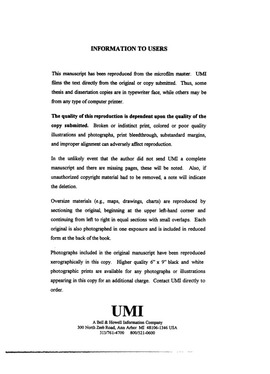| dc.contributor.advisor | Rideout, Roger R., | en_US |
| dc.contributor.author | Phillips, Mark Wendell. | en_US |
| dc.date.accessioned | 2013-08-16T12:29:37Z | |
| dc.date.available | 2013-08-16T12:29:37Z | |
| dc.date.issued | 1997 | en_US |
| dc.identifier.uri | https://hdl.handle.net/11244/5478 | |
| dc.description.abstract | Results were reported in the form of type tables with data separated by gender, degree classification (Bachelor of Music or Bachelor of Music Education), applied instrument group (Brass, Woodwind, Voice, Keyboard, or Percussion). The composite sample and subsamples were compared to the base population of traditional age college students compiled in the CAPT databank. Self-Selection Ratios, Chi Square and Fisher's Exact Probability tests were calculated to determine if any significant differences existed between the base population and the research composite and subsamples. Model MBTI types were determined for the composite and subsamples. At four of the six institutions, the males in the sample differed from base population predictions. The males were dominantly introverts (ISTI) while databank information indicated they would be extroverts (ESTJ). Base population predictions were confirmed for males at the other two schools. Differences in male students were hypothesized to correlate with differing admission standards and entrance exams in the departments of music, meaning those students whose types were consistent with CAPT predictions had school entrance requirements that might require a more aggressive or extroverted personality. Females in the composite and subsamples met base population predictions at all six schools with the exception of the sensing/feeling scale. Base population predictions were that the females would be feeling types (ESFJ) while the sample females were overwhelmingly (55.56%) thinking types (ESTJ). Brass majors model type was ESTJ while voice majors was ESJ with thinking (T) and feeling (F) equally distributed. The keyboard majors formed a model ISTJ while the woodwind major model was STJ with extroversion (E) and introversion (I) equally distributed. The model for percussion majors was IST with judgment (J) and perception (P) evenly distributed. The Bachelor of Music degree students were predominantly ISTJ while the Bachelor of Music Education degree students were ESTJ. These differences seemed attributable to the number of males or females enrolled in each degree plan, meaning that the dominant personality type of each gender skewed the analysis of subsample data toward that gender's type. | en_US |
| dc.description.abstract | The purpose of this study was to determine the personality characteristics of undergraduate music majors at selected historically African-American colleges and universities utilizing Form G of the Myers-Briggs Type Indicator (MBTI). The study extended work by Henderson and Lanning by asking whether differences exist between African-American music majors and traditional college-age music majors whose MBTI types are on record at the Center for the Application of Psychological Type (CAPT) in Gainesville, Florida. The study was the first to focus solely on African-American music majors and compare types according to gender, music degree emphasis, major applied performance area, and academic institution. | en_US |
| dc.description.abstract | The sample consisted of 145 full-time undergraduate music majors between eighteen to twenty-four years of age at six historically African-American colleges and universities across the continental United States. Each school had twenty or more music majors enrolled full-time in undergraduate degree programs. All participating schools were state supported and two were land grant institutions. | en_US |
| dc.format.extent | xii, 126 leaves ; | en_US |
| dc.subject | African American universities and colleges | en_US |
| dc.subject | Black Studies. | en_US |
| dc.subject | Myers-Briggs Type Indicators. | en_US |
| dc.subject | Education, Music. | en_US |
| dc.subject | African American college students Psychology. | en_US |
| dc.subject | Psychology, Personality. | en_US |
| dc.subject | Music in universities and colleges. | en_US |
| dc.subject | Education, Educational Psychology. | en_US |
| dc.title | Personality characteristics of undergraduate music majors in selected historically African-American colleges and universities: An investigation of relationships as measured by the Myers-Briggs Type Indicator. | en_US |
| dc.type | Thesis | en_US |
| dc.thesis.degree | Ph.D. | en_US |
| dc.thesis.degreeDiscipline | School of Music | en_US |
| dc.note | Source: Dissertation Abstracts International, Volume: 58-03, Section: A, page: 0792. | en_US |
| dc.note | Major Professor: Roger R. Rideout. | en_US |
| ou.identifier | (UMI)AAI9724434 | en_US |
| ou.group | Weitzenhoffer Family College of Fine Arts::School of Music | |
